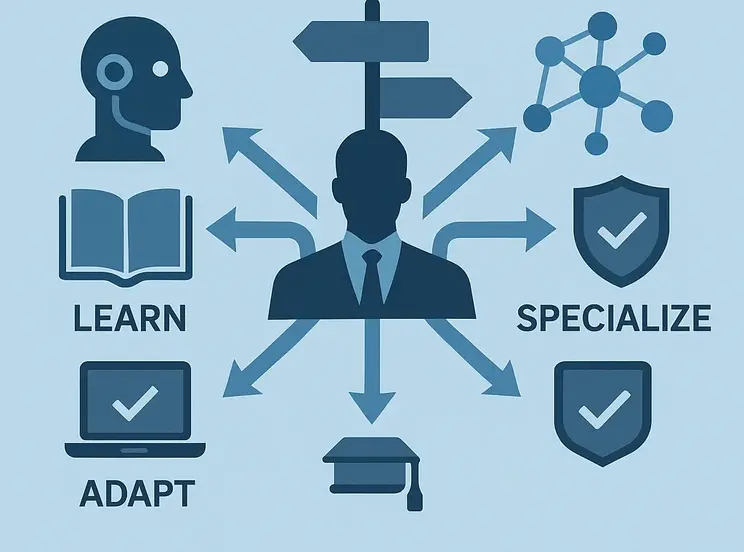The AI Dilemma: How to Guide Career Decisions in an Uncertain Future
The rapid advancement of artificial intelligence has created a profound challenge for parents, mentors, and career advisors worldwide. When technology evolves at breakneck speed and AI capabilities continue to expand exponentially, how do we provide meaningful career guidance to the next generation? This question has even left industry leaders like Elon Musk speechless, highlighting the complexity of navigating career choices in an AI-driven world.
According to recent research from McKinsey Global Institute, AI could potentially automate up to 30% of current work activities by 2030, making AI career advice more crucial than ever before.
The traditional career advice model, built on decades of stable industry patterns, now faces unprecedented disruption. As AI systems become more sophisticated and capable of performing tasks once thought uniquely human, the career landscape is undergoing a fundamental transformation. This shift requires a new approach to career guidance—one that acknowledges uncertainty while providing actionable strategies for building resilient, future-proof careers.
Understanding the AI Career Revolution
The integration of artificial intelligence into various industries has created both opportunities and challenges for career development. Unlike previous technological revolutions, AI’s impact spans across virtually every sector, from healthcare and finance to creative industries and manual labor. This widespread disruption means that no career path is entirely immune to AI’s influence.
However, this transformation also presents unprecedented opportunities for those who can adapt and leverage AI as a tool rather than viewing it as a threat. The key lies in understanding how to position oneself in roles that complement AI capabilities rather than compete with them. This requires a fundamental shift in how we think about skill development and career planning.
The Human-AI Collaboration Model
The most successful careers in the AI era will likely be those that embrace human-AI collaboration rather than competition. While AI excels at processing vast amounts of data, identifying patterns, and performing repetitive tasks with high precision, humans bring unique value through creativity, emotional intelligence, complex problem-solving, and ethical decision-making.
This collaboration model suggests that future-proof careers will focus on areas where human judgment, creativity, and interpersonal skills remain irreplaceable. Roles that require nuanced understanding of human behavior, creative problem-solving, or ethical considerations will continue to thrive even as AI capabilities expand.
Building Resilience in Your Career Strategy
The uncertainty surrounding AI’s impact on various industries requires a more flexible and adaptive approach to career planning. Rather than choosing a single career path and sticking to it rigidly, successful professionals will need to develop transferable skills and maintain the ability to pivot as technology evolves.
This resilience-based approach involves several key strategies. First, focus on developing skills that are difficult to automate, such as critical thinking, creativity, emotional intelligence, and complex communication. These human-centric skills will remain valuable regardless of how AI technology advances.
Second, cultivate a mindset of continuous learning and adaptation. The ability to quickly learn new technologies and adapt to changing industry requirements will be crucial for long-term career success. This doesn’t mean becoming an expert in every new technology, but rather developing the capacity to understand and work with emerging tools effectively.
The Value of Interdisciplinary Knowledge
In an AI-driven world, professionals who can bridge multiple domains will have significant advantages. The most valuable insights often come from combining knowledge across different fields—something that AI systems, while powerful, still struggle to do effectively.
Consider developing expertise in areas that combine technical understanding with human-centered disciplines. For example, professionals who understand both AI capabilities and human psychology, or those who can bridge technology and business strategy, will find themselves in high demand. This interdisciplinary approach creates unique value propositions that are difficult to replicate or automate.
Practical Strategies for Future-Proofing Your Career
While the future remains uncertain, several practical strategies can help individuals build careers that remain relevant and valuable in an AI-enhanced world. These approaches focus on leveraging human strengths while embracing technological advancement.
Developing AI Literacy
Understanding how AI works, its current capabilities, and its limitations is crucial for career success. This doesn’t require becoming a computer scientist, but rather developing enough knowledge to work effectively with AI tools and understand their implications for your industry.
For those looking to enhance their professional development, our guide on essential skills for the 21st century provides valuable insights into building a competitive skill set that complements AI capabilities.
AI literacy involves understanding basic concepts like machine learning, natural language processing, and automation. It also means staying informed about how AI is being applied in your specific field and industry. This knowledge allows you to identify opportunities where AI can enhance your work rather than replace it.
Hiring? Post Jobs for Free with WhatJobs
Looking to hire AI-savvy professionals for your organization? WhatJobs makes it easy to post job opportunities and connect with candidates who understand the future of work. Post your positions for free and find the talent you need to drive innovation in the AI era.
Focusing on Human-Centric Skills
As AI takes over more routine and analytical tasks, the skills that remain uniquely human become increasingly valuable. These include emotional intelligence, creativity, complex problem-solving, and the ability to build and maintain relationships.
Invest time in developing these human-centric skills through practice, training, and real-world application. Seek opportunities that allow you to exercise creativity, work with diverse teams, and solve complex problems that require human judgment and intuition.
Building a Personal Brand and Network
In an increasingly automated world, personal connections and reputation become even more important. Building a strong professional network and developing a clear personal brand can help you stand out and create opportunities that AI cannot replicate.
Focus on building genuine relationships within your industry, sharing valuable insights and knowledge, and positioning yourself as a thought leader in your area of expertise. These human connections often lead to opportunities that algorithms cannot predict or facilitate.
Our comprehensive guide on mastering LinkedIn algorithm for job search success offers practical strategies for building your professional network and personal brand in the digital age.
The Role of Continuous Learning and Adaptation
The pace of technological change means that the skills that are valuable today may become obsolete tomorrow. This reality makes continuous learning not just beneficial but essential for career longevity.
Embracing Lifelong Learning
Successful professionals in the AI era will be those who commit to ongoing education and skill development. This doesn’t necessarily mean pursuing formal degrees continuously, but rather maintaining a habit of learning new skills, staying current with industry trends, and being open to new ways of working.
Consider developing a learning routine that includes reading industry publications, taking online courses, attending conferences, and seeking mentorship from more experienced professionals. The goal is to stay ahead of technological changes rather than reacting to them after they’ve already impacted your career.
A study by Harvard Business Review found that organizations that invest in AI literacy training for their employees see 40% higher productivity gains, highlighting the importance of continuous learning in the AI era.
Developing Transferable Skills
Focus on building skills that can be applied across different roles and industries. These transferable skills include project management, communication, leadership, problem-solving, and adaptability. These competencies remain valuable regardless of how technology evolves and can help you transition between different career paths as needed.
For practical guidance on developing these skills, explore our article on two-track career development strategies that can help you build multiple income streams and career paths simultaneously.
Ethical Considerations in AI-Driven Careers
As AI becomes more integrated into various industries, ethical considerations become increasingly important. Professionals who can navigate the ethical implications of AI use will be valuable assets to organizations.
Understanding AI Ethics
Develop an understanding of the ethical considerations surrounding AI, including issues of bias, privacy, transparency, and accountability. This knowledge will be valuable in roles that involve implementing or overseeing AI systems, as organizations increasingly recognize the importance of responsible AI use.
Contributing to Responsible AI Development
For those working in technology fields, consider how you can contribute to the development of AI systems that are fair, transparent, and beneficial to society. This might involve advocating for ethical AI practices within your organization or contributing to open-source projects that promote responsible AI development.
Conclusion: Embracing Uncertainty with Confidence
The challenge of providing career advice in the AI era is indeed complex, as even industry leaders struggle to provide concrete guidance. However, this uncertainty doesn’t mean that career planning is futile—it simply requires a different approach.
The key is to focus on building a career that leverages human strengths while embracing technological advancement. By developing skills that complement AI capabilities, maintaining flexibility and adaptability, and staying committed to continuous learning, individuals can build careers that remain relevant and valuable regardless of how technology evolves.
The future may be uncertain, but by focusing on what makes us uniquely human—our creativity, emotional intelligence, and ability to make ethical judgments—we can navigate the AI revolution with confidence and purpose.
Ready to take the next step in your career journey? Search for AI-related jobs and opportunities on WhatJobs to find positions that align with your future-proof career strategy.
Frequently Asked Questions
How can I prepare my career for AI disruption?
Preparing your career for AI disruption involves developing skills that complement AI capabilities rather than compete with them. Focus on human-centric skills like creativity, emotional intelligence, complex problem-solving, and ethical decision-making. Additionally, build AI literacy to understand how to work effectively with AI tools and stay committed to continuous learning to adapt as technology evolves.
What are the most future-proof career paths in the AI era?
The most future-proof career paths in the AI era are those that leverage human strengths that AI cannot easily replicate. These include roles in creative industries, healthcare, education, counseling, and positions that require complex human interaction and ethical judgment. Careers that combine technical knowledge with human-centered skills, such as AI ethics specialists or human-AI interaction designers, are also likely to remain valuable.
How should I advise my children about career choices with AI advancing so rapidly?
When advising children about career choices in the AI era, focus on developing transferable skills and a growth mindset rather than choosing a specific career path. Encourage them to build skills in creativity, critical thinking, emotional intelligence, and adaptability. Help them understand the importance of continuous learning and guide them toward careers that leverage human strengths while embracing technological advancement.
What skills should I prioritize developing to stay competitive in an AI-driven job market?
To stay competitive in an AI-driven job market, prioritize developing skills that are difficult to automate. These include creativity and innovation, emotional intelligence and interpersonal skills, complex problem-solving and critical thinking, leadership and management abilities, and ethical decision-making. Additionally, build AI literacy to understand how to work effectively with AI tools and develop a mindset of continuous learning and adaptation.






